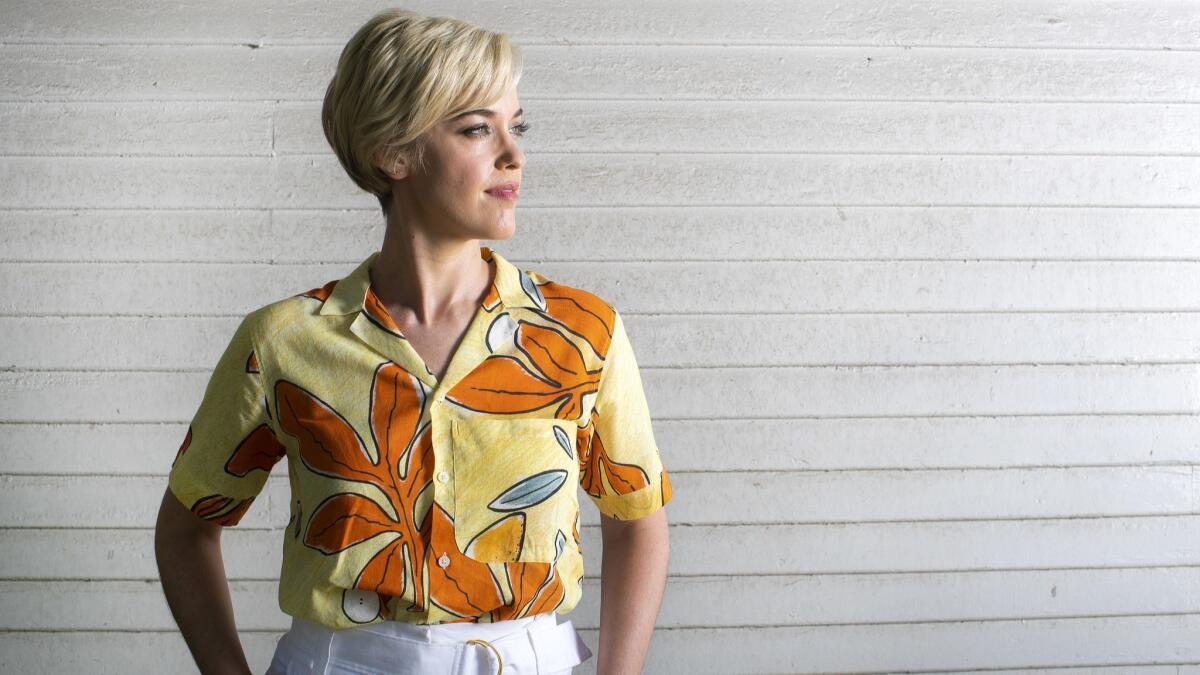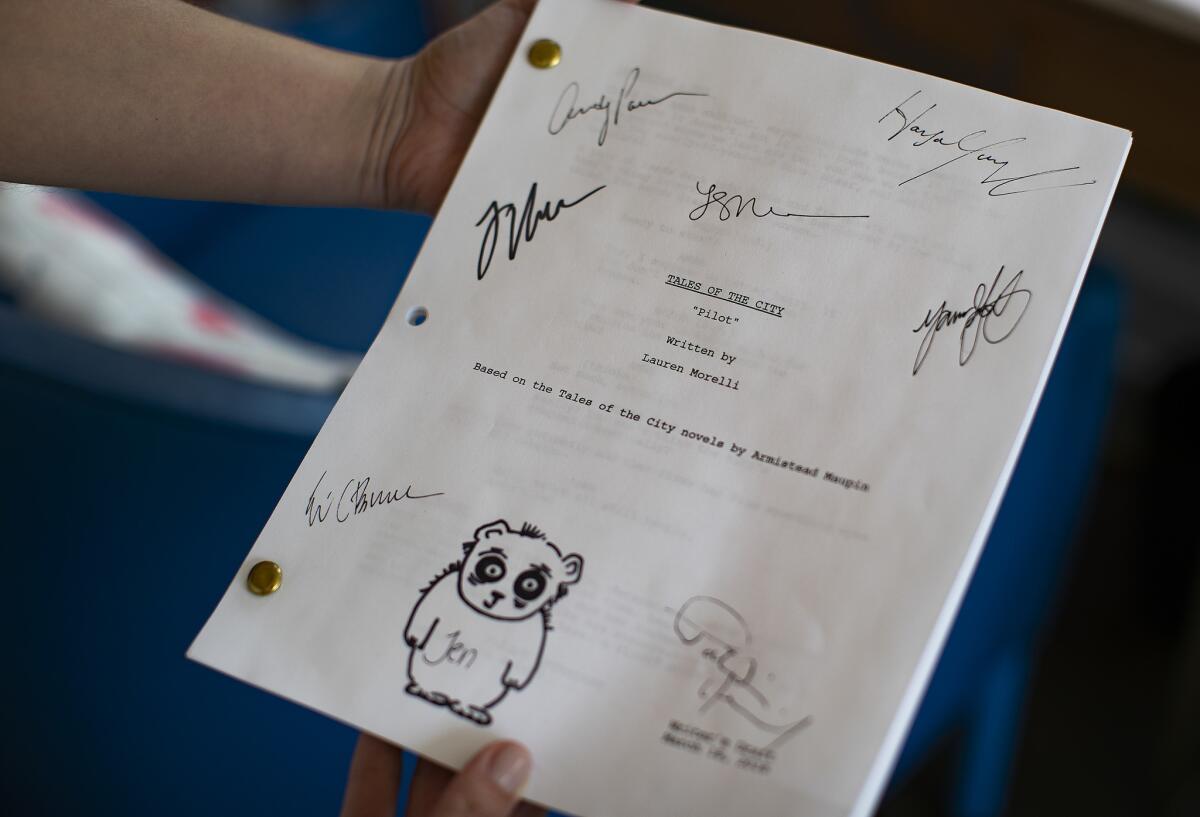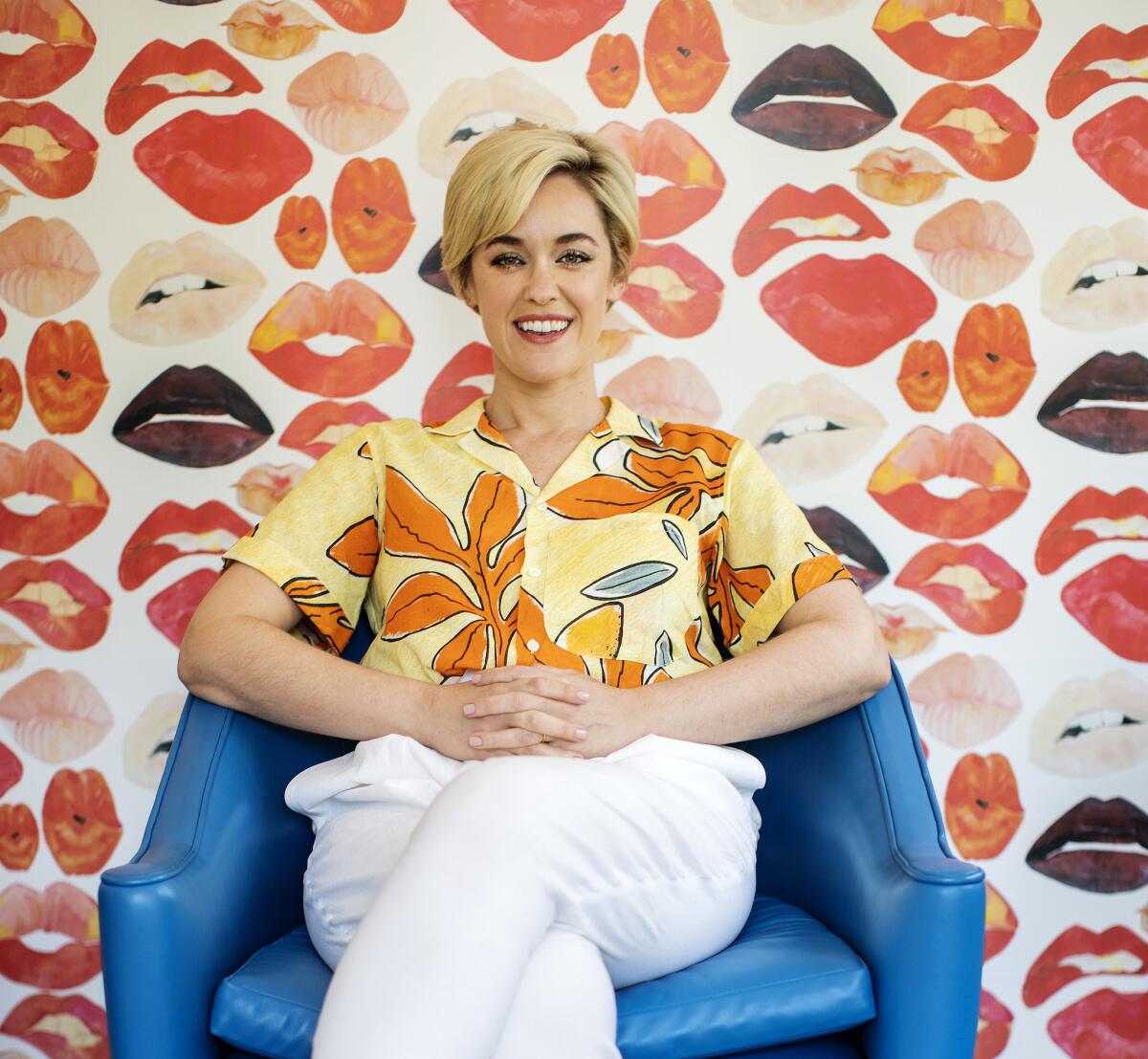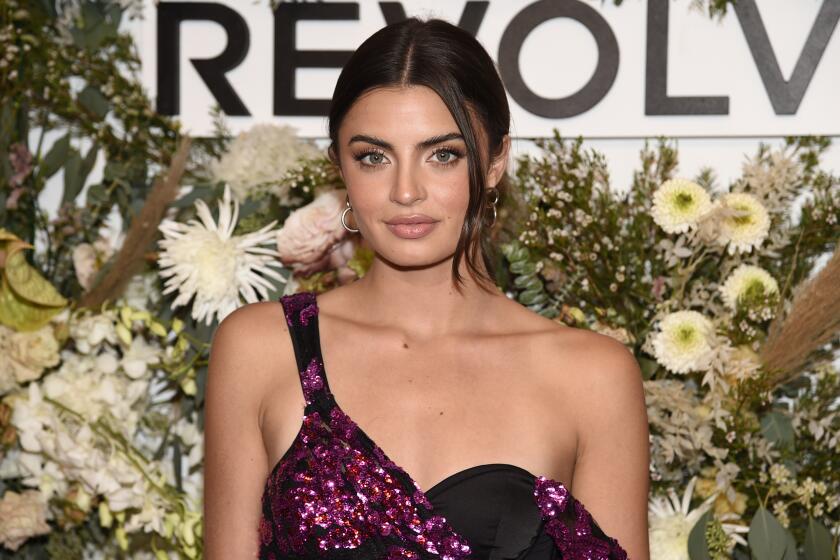‘Tales of the City’s’ Lauren Morelli on her LGBTQ writers room and lessons from Jenji Kohan

- Share via
In this series, Running the Show, The Times speaks with showrunners of your favorite TV programs about breaking into Hollywood, being the boss and more challenges of the job.
Lauren Morelli is embarrassed to admit she had never heard of “Tales of the City,” the groundbreaking LGBTQ literary saga from Armistead Maupin, when she was initially approached to work on its TV revival.
Maupin’s nine-book series, which ran from 1978 until its conclusion in 2014, introduced the world of 28 Barbary Lane, the small apartment complex in San Francisco where a circle of sexually diverse friends reside and are united by love and friendship. Three TV adaptations were made: 1993’s “Tales of the City,” which aired on PBS; then on Showtime, 1998’s “More Tales of the City” and 2001’s “Further Tales of the City.” They followed the journey of Mary Ann Singleton (Laura Linney), a naive transplant from Cleveland, Ohio, who moves to the city in the late 1970s and is taken under the wing of the building’s beloved transgender owner, Anna Madrigal (Olympia Dukakis) and the complex’s residents.
Morelli, who previously worked as a writer and co-executive producer on Netflix’s “Orange Is the New Black,” was originally enlisted to help nail down the voice of Mary Ann’s daughter Shawna, a new queer character that Ellen Page was tapped to play for the next TV chapter in development. When Netflix ordered the project to series, Morelli was brought on as showrunner of the 10-episode installment.
“It’s really interesting because, for a certain generation of queer person, they have grown up with ‘Tales’ and live and die by it,” says Morell, 36. “And that’s one of the things I’m excited about with the reboot. It feels like there are a lot of people who just missed it.”
“Tales of the City,” available to stream beginning June 7, put Morelli in the showrunner seat for the first time — and marks just the second series she’s worked on. (Though it’s not the last; she’s got at least one more series in development for Netflix.) For Morelli, who came out in her 30s and is married to Emmy-winning actress Samira Wiley (“The Handmaid’s Tale”) — the two met on the set of “Orange Is the New Black” — creating a space for and telling LGBTQ stories is something she’s passionate about.
“I personally could really use a safe space these days,” says Morelli, who is on the board of the Trevor Project, which provides crisis intervention services to LGBTQ youth. “It’s really hard to understand and process the traumas that we’re all going through on a daily basis, specifically within the LGBTQ community. I just really hope the show can give people some hope and an escape for 10 hours.”
Three weeks fresh from wrapping production on the show in New York, Morelli is in her brightly lit office inside the home she shares with Wiley in Los Angeles. There, against a backdrop of lip-patterned wallpaper, Morelli talked about her writing routine, what went into assembling an LGBTQ writers room and what she learned from having Jenji Kohan as a boss.

A UCLA extension course and the road to writing ...
I was a theater kid. I was an actor and a dancer. I did all the musicals and whatever. I wrote little stuff when I was a kid. I was forcing my mom to read my five-page terrible books. But it took me a really long time. I got a BFA in modern dance. I didn’t start really writing until my mid-20s. My therapist was like, “You aren’t dancing anymore. You don’t have a creative outlet. I think you need to find something.” So I took a class at UCLA Extension in short fiction. And started writing purely just for myself. I never would have thought that I could do it professionally. And then it sort of snowballed from there. I just loved it.
I was the family assistant at the time to the CFO at Disney. I did that for five years. It was a really great job in many ways. It allowed me time to write, and they were very supportive. I started writing bad spec scripts because I didn’t really know what else to do. I did a “Mad Men” one — I’m so sorry, Matthew Weiner — one on “Glee,” and I think there was a “Parenthood” spec.
I still am not, at the time, doing it because I think it’s going to be a career. I had friends who were either aspiring writers or aspiring directors. Or people who were beginning to get a foothold in the industry, which, I think at the time, was both really inspiring and also really depressing because I felt so lost. So to be surrounded by people who had such a clear understanding of what they wanted to do was difficult for me. So many people move here with a very clear ambition. We do a lot of the whole, “This is the way you do it,” and that’s super stressful. In fact, there are a million ways to do it if you’re willing to hang in there. I mean, I applied to the Warner Bros. workshop three years in a row. And I was rejected three years in a row.
At some point, a friend sent a script of mine to a manager friend of hers. About a year after I started working with my manager, she helped me get an agent. I remember at that moment thinking, “Oh, my God, the road is paved with gold. This is it.” But it was another two years until I got staffed on “Orange.” It was two years of phone calls saying, “So and so’s show is staffing and we’re going to submit you.” And then nothing would happen. I wasn’t even getting meetings. I just realized this the other day, but when I met [creator and showrunner] Jenji Kohan for “Orange Is the New Black,” it was my first staffing meeting. And now it’s so funny because I got staffed on “Orange” when I was 30 and I remember feeling very behind — I felt behind and old. And now I’m like, “Oh, I was neither of those things.” It happened at the right time.
You become a first-time showrunner. Now what?
I started reading all these management books, because I was like, “I’m going to be in charge of people?” I was really excited to run the room, and I was really excited to get to staff and oversee a group of writers. That part, even though I knew it would be challenging, I was excited for because I had direct experience with it. But all of the other stuff — making decisions, budgets, overseeing hundreds of people in production — there were just so many things where I was like, “This is very far outside of my purview.” So I read a lot of books in an attempt to train myself.
There were so many things where people would start talking to me about something, and it was like they were speaking a different language, and I would just have to go through the conversation and pretend like I knew what they were talking about. I also was very lucky in that I have a couple of close friends who are showrunners and Jenji continues to be a mentor to me. Mostly my texts to her were like, “I’m losing my mind.” And then just to get a text of like, “Yes, that’s normal,” made me feel OK. I think I had been in a bit of a bubble because I watched Jenji run the show for so long and had only ever experienced having a female boss. She’s such a badass and handles it so beautifully. We were on a walk recently and I was like, “I have to tell you ... I watched you do this job for five years and I thought I knew … .” but I had no idea the breadth of stuff she was doing when she wasn’t in the room.
The temptation is to start to wield your power so that people have to respect you and they know who you are. But I constantly had to remind myself that that wasn’t going to be my way of holding power. I’m hopeful that we can start to upend this deeply rooted paradigm of what power looks like and that maybe it was OK if I wasn’t immediately on top of things — that I could be a little more generous and open-minded and team-oriented and that didn’t have to undercut my leadership.

Taking cues from Jenji Kohan
There were so many amazing things that I learned from Jenji. One of them is her room runs from 10 a.m. to 4 p.m. “Weeds” had been that way too, I think. And I remember being so amazed that I was in a writers room where we were working not a lot of hours; it was so civilized, and that you could prove that you didn’t have to work until 1 a.m. and agonize over it, and that the project could still be good? To learn that lesson early in my career and be able to trust it. She always said — and she was right — you kind of burn out by 4 o’clock. There’s so much interaction, and there are so many ideas being thrown around, and you’re very focused on what you’re doing when you’re there. And I just thought, “Well, this is the way to do it.” You know? She was very big on on the idea of “Go home and live your lives.” Because if you’re in the room for 24 hours a day, then you’re not living and you’re not bringing anything back into the room.
I don’t know that I would’ve had the courage to do that if she hadn’t showed me that it makes better writing.
She’s also very character-driven. She’s very big on: If you don’t know why someone’s doing it, then you’ve gone too far. Let’s come back and really understand why are they doing this.
On assembling an LGBTQ room
I felt really passionate about it from the beginning. I know that there are not a lot of queer shows that get made. We are so starved for representation. So while I knew the show couldn’t even come close to representing everything, because no show can, I really wanted to portray the breadth of diverse queer experiences that exist in our community. And that meant diversifying the room race-wise, class-wise, age-wise ... . Having an intergenerational room just like the show felt important.
And it was a challenge. When I told people that I wanted to hire queer people, the vast majority of submissions I got were white and male and of a certain age. Luckily I had that experience of watching Jenji staff. I went after playwrights, and I just started asking everybody I knew, like, “Who do you know that’s not on my radar? Who do you love? Who do you respect?” I would say probably 50% of the room came to me from friends recommending other people to me. I was just really scouring the depths to make sure we were finding exciting voices.
We had a lot of conversations that I still think about every day. Being in a room where suddenly, we weren’t othered in any way felt transformative and poignant for all of us in different ways. To be in this bubble where suddenly the queer experience was centered. And certainly maybe we were educating one another when things came up, but you’re not educating in a way that feels reductive, I’ll say. It was a really magical experience for me and I think for all of them as well.
On writing rituals
When I’m writing, I tend to be pretty diligent and stringent with myself. I’m up at 6 a.m. I journal first thing; I pull a tarot card in the morning. I have a ritual. I do morning pages from “The Artist’s Way,” which I’m hiding in my drawer. The author [Julia Cameron] has this thing called morning pages, where you write for three pages no matter what — even if two of those are, “I don’t know what I’m doing; I hate doing this.” It just gets you going. I’ve found it to be really helpful for me just to get out whatever I need to get out. Then I write until, if I’m not under a crazy deadline, I’ll write until noon or 1. And then I’m kind of burned-out and can go about my day and live my life and do my errands. But if I’m under a crazy deadline, then I write all day.
One of the first things I do when I’m taking on a new script or project is I make a playlist of stuff that feels right for whatever reason. The next thing I’m writing is period, so I researched that and found a bunch of stuff from that period. For “Tales,” actually, I sort of went by character. I had a Shawna playlist and a Mary Ann playlist. It helps me get a sense of who they are and then live in that space.
Twitter: @villarrealy
More to Read
The complete guide to home viewing
Get Screen Gab for everything about the TV shows and streaming movies everyone’s talking about.
You may occasionally receive promotional content from the Los Angeles Times.







